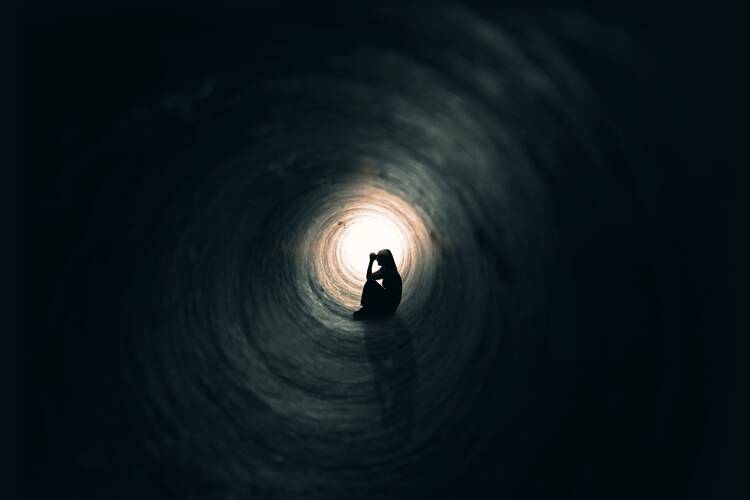In her poem “There’s a certain Slant of light,” Emily Dickinson reflects upon the experience of depression and despair. This phenomenon oppresses, hurts, causes “internal difference,” leaving the soul without meaning. Worse yet, we humans find no instructors to explain this pervasive reality: “None may teach it—Any—’Tis the Seal Despair.”
Maybe the Belle of Amherst was wrong. Maybe there are people—psychiatrists, psychologists, philosophers, individuals who live with depression—who can offer some insights into this dark mystery. Recently, Daphne Merkin wrote This Close to Happy: A Reckoning with Depression. Her autobiographical work is brutally honest, wonderfully informative and painfully poignant. It is her story of depression, so detailed and revelatory that she is aware of “disapproving critics ready to pick away my every word and accuse me of all the potential hazards of writing autobiographically, from self-absorption to self-pity, with stops along the way for excessive candor and unsightly narcissism.”
Maybe there are people—psychiatrists, psychologists, philosophers—who can offer some insights into this dark mystery.
What is the cause for depression? Merkin grapples with the nature-nurture paradigm. Perhaps depression arises from the elementary fact that we are born with it. In her stirring poem “Having it Out with Melancholy,” Jane Kenyon writes about being born into sadness and melancholy: “When I was born you waited / behind a pile of linen in the nursery.” Into every pore of her infant body was poured “a bile of desolation.” James Boswell in his The Life of Samuel Johnson time and time again asserts that Johnson’s very make up was “constitutional melancholy.” Throughout his life, Johnson had to struggle with an abiding heaviness, dark seasons, inner bleakness. Depression, in these cases, is grounded in one’s genes and chemistry. Medication may offer some relief.
But then there are those who see one’s childhood or the want of proper nurturing as causes of depression. Merkin describes her parents as narcissistic and lacking in empathy: “My parents should never have had children...there was no love in our home.” When children are not loved, when there is physical or psychological violence, when gifts are not recognized and developed, the human spirit sinks into grief and meaninglessness. Many individuals (who can afford it) seek therapy to work through their lack of self-worth and mistreatment.
Obviously, depression can arise from both one’s brain chemistry and one’s upbringing. As Merkin writes: “Depression comes about because of a confluence of genetic propensity and the triggering circumstances.” And so we have here three choices in analyzing depression: biological, environmental and a combination of the two.
Is there a fourth possible element in the cause of depression and misery? Maybe there is a connection between depression and morality, between morale and morals. There is a prayer in the liturgy that reads: “God of all compassion, Father of all goodness, to heal the wounds our sins and selfishness bring upon us, you bid us turn to fasting, prayer, and sharing with our brothers and sisters.” Is there something in the very nature of sin and narcissism that wounds us, that makes us sad? We must be clear: some forms of depression having nothing to do with sin and selfishness. But the experience of sadness, melancholy and depression is sometimes grounded in our greed, our anger, our lust, our inordinate pride. These vices “bring upon us,” by their very nature, a heaviness of spirit.
Is there something in the very nature of sin and narcissism that wounds us, that makes us sad?
In the end, depression has no guru to explain this enigma. This should not be surprising. We might as well ask about the meaning of love. In the background we hear lyrics from “South Pacific”: “Who can explain it, who can tell you why? / Fools give you reasons, wise men never try.” Love and depression escape our full understanding given our limited intelligence.
Lest this brief essay on depression is depressing to the reader, let me end by quoting John Horgan: “This is by far the greatest gift that mystical experiences can bestow on us: to see—really see—all that is right with the world. Just as believers in a beneficent deity should be haunted by the problem of natural evil, so agnostics, atheists, pessimists, and nihilists should be haunted by the problem of friendship, love, beauty, truth, humor, compassion, fun. Never forget the problem of fun.”











Depression is as individualized as personal taste. I would never suggest that it has to do with sin or pride. It is a heavy weight and a struggle to bear. Even with the latest lifestyle changes; I do not believe that it can be resolved ever without faith in Jesus Christ and a personal connection to him as savior and Lord of life. I would offer that depression is very explainable as an "individualized" diagnosis. I also would offer that one cannot give up and must stay consistent with everything that is working for that individual to survive. I have often thought that depression is a survival mode not always needing to be explained.